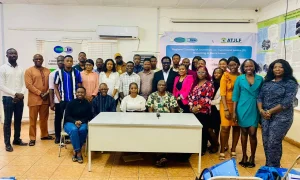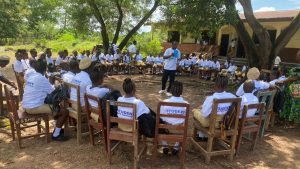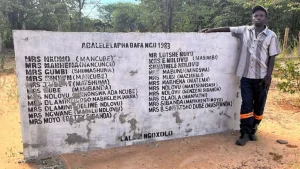Sierra Leone – Famboul Tok Peace Mothers
Refresher Training for Peace Mothers- Provided refresher training to 100 Peace Mothers on alternative dispute resolution mechanisms. Training topics were on mediation and negotiation. This strengthened their capacity to resolve local conflicts and reinforced the role of women in promoting social cohesion. One hundred (100) Peace Mothers received refresher training on alternative dispute resolution (ADR) techniques: This training was a structured and participatory process aimed at enhancing their capacity to address local conflicts and promote reconciliation within their communities. This initiative recognized the pivotal role of Peace Mothers as grassroots mediators and sought to empower them further with advanced conflict resolution skills, strengthened their ability to address local conflicts through culturally relevant approaches and reinforced their roles as mediators in promoting reconciliation. The direct beneficiaries of this activity included the 100 Peace Mothers (all women), while an estimated 1,200 community members indirectly benefited from their enhanced conflict resolution skills. The refresher training not only reinforced the critical role of Peace Mothers in promoting reconciliation but also strengthened their confidence and credibility as mediators, ensuring they continue to serve as vital pillars of social cohesion in their communities.
Cote d’Ivoire – COVICI (Victim Psychosocial Support Post Sexual Violence)
Focusing on youth and women who suffered sexual violence during the crisis, this project provides victims with quality psycho-social support by training at least 250 community-based peer counsellors who will, in turn, organize healing sessions within their communities. Building upon a previous project, it is expected that this project would lead to the establishment of a network of community members enabled to provide basic and immediate psychosocial care to other community members. It is expected that this network will function well beyond the end of ATJLF’s funding. During implementation, cases that present serious traumatic symptoms are referred to social workers who will partner with COVICI throughout the project. The importance of this project is due to the fact that psychosocial support for victims has been a quasi-neglected area in Cote d’Ivoire in recent times.
Northeast Nigeria – KISHIMI Shelter and Care Foundation
Gambia – WAVE – The Kaira Bengho ka Kairo Balundi (Peace Talks for Peace Building, Individual and Community Healing and Reconciliation)
Initiative seeks to foster social cohesion and strengthen connections among marginalized communities and their neighbors in The Gambia, particularly those impacted by the witch hunt campaigns. The witch hunt campaigns in The Gambia, which occurred between 2009 and 2016, had a devastating impact on the victims, particularly elderly women. The initiative aims to foster a sense of belonging for all community members and ensure that diversity is valued within the community. By promoting social cohesion and mutual understanding, the initiative aims to create a more just and equitable society, promoting long-term peace and prosperity. The initiative will also support the establishment of Peace Committees as recommended by Gambia’s Truth, Reparations, and Reconciliation Commission (TRRC), including creating and documenting public conversations and debates and facilitating intra and inter-community dialogue, reconciliation, and healing at the community level, as recommended by the African Union Transitional Justice Policy (AUTJP). The project will be implemented in Makumbaya, West Coast Region, Kerr Mot Ali, Upper Saloum and Foni District; all areas with robust victim communities. The overall objectives of the project are to continue engagements with victims’ communities post TRRC era, contribute to their healing and support their quest for reparative and restorative justice, social cohesion, and peaceful coexistence. With initiatives like capacity building programs for Women Support Groups.
GACRB – Creating a Sexual Offenders’ List
A key component of GACRB’s work in northern Nigeria, this project will establish a Sexual Offenders’ Register in partnership with the National Human Rights Commission (NHRC) and Borno State. This initiative aims to enhance access to justice and reparations for survivors of sexual and gender-based violence (SGBV), most of whom are women in Northeast Nigeria. By systematically documenting offenders, the project seeks to deter future violations and provide a structured framework for survivor-centered justice.
In addition to the foregoing projects, the Initiative for Transitional Justice in Africa where ATJLF leads on grant-making also has the participation and inclusion of women in institutional transitional justice processes as one of its main themes, demonstrating ATJLF’s resolute commitment to centering women in transitional justice and post-conflict recovery.
Author
-
Pelumi Obisesan is the Programs and Communications Lead at the Africa Transitional Justice Legacy Fund.
View all posts



